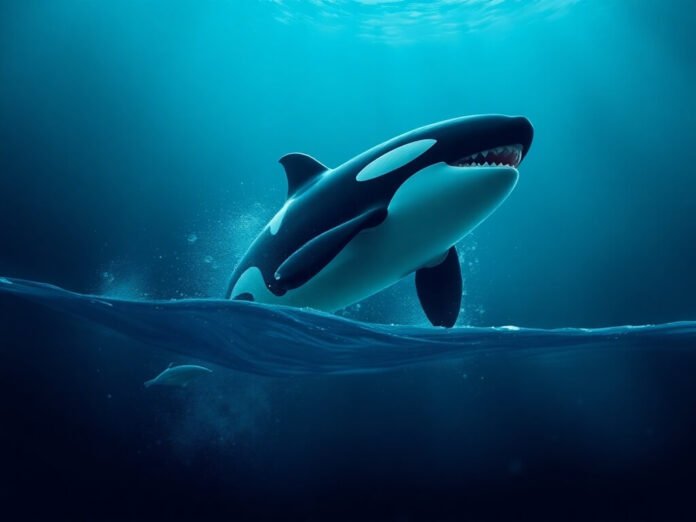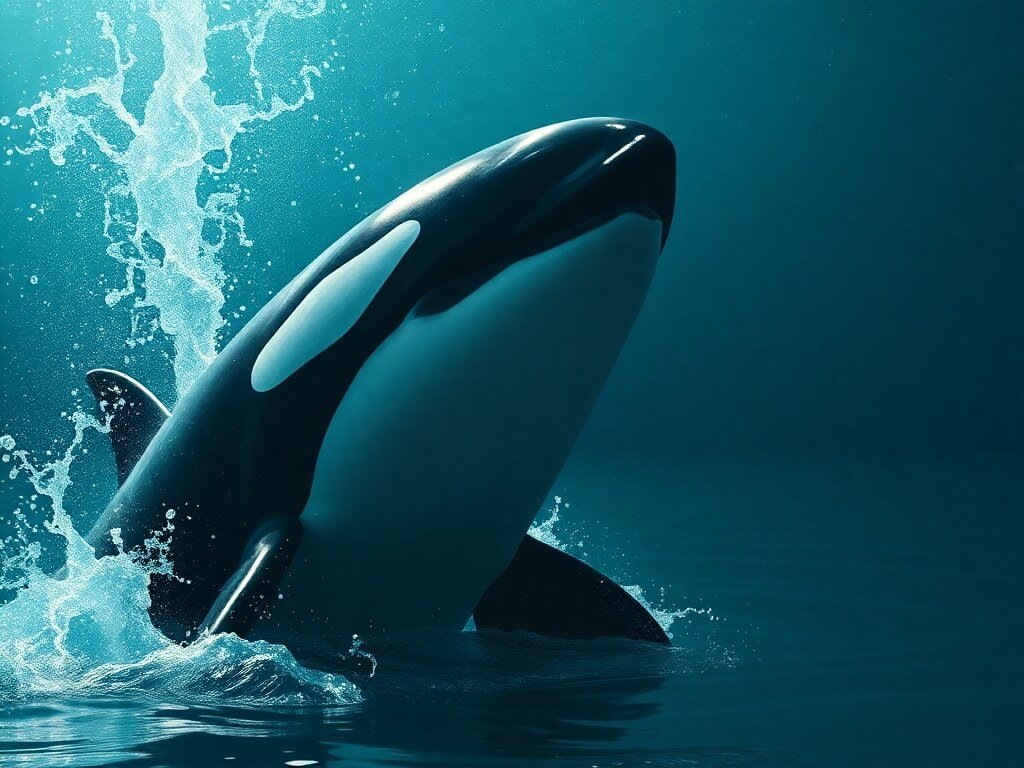The 1977 movie Orca has maintained a cult following among fans of nature thrillers, shark movies, and animal-centric films. Directed by Michael Anderson and featuring a standout performance from Richard Harris, Orca is a suspenseful, emotionally charged tale of a killer whale’s pursuit of vengeance. While the film didn’t garner as much critical acclaim as some of its contemporaries, its unique premise and eerie exploration of nature’s darker side make it a noteworthy addition to the genre of animal horror films. In this article, we’ll explore the plot, themes, characters, production history, and legacy of Orca and why it remains a standout “killer whale” film.
Overview of the Movie Orca
The plot of Orca centres around an enraged killer whale who seeks revenge after a fisherman, Captain Nolan (played by Richard Harris), inadvertently kills its mate. The story begins with Captain Nolan, a veteran fisherman, attempting to capture the killer whale and sell it to a marine park. However, during the capture attempt, he accidentally causes the whale’s mate to die, setting off a series of vengeful actions by the whale. The killer whale then begins a methodical, intelligent pursuit of Captain Nolan, targeting him and those close to him in a chilling game of cat and mouse.
Though the plot resembles Jaws—a 1975 hit film about a monstrous shark terrorizing a beach town—Orca brings a fresh twist by focusing on the psychological battle between man and beast. The whale’s vengeful pursuit highlights the idea of animal intelligence and empathy.
The film also delves into moral and ethical questions surrounding humanity’s exploitation of animals for profit. Initially portrayed as a rugged, morally ambiguous figure, Captain Nolan transforms over the course of the film into a tragic character who must confront the consequences of his actions.
Themes of Revenge, Nature, and Consequences
One of the key themes in Orca is the idea of revenge. The killer whale’s relentless pursuit of Captain Nolan is not merely an animal instinct but a calculated, emotional response to the death of its mate. The whale’s vengeful behaviour pushes the narrative into an unusual territory, where the audience can empathize with the animal’s sorrow and anger despite its destructive actions.
This anthropomorphism—imbuing the whale with human-like emotions—creates a sense of moral ambiguity in the film. Nolan, who at first appears to be the villain for capturing and killing the whale’s mate, is later revealed to be a tragic figure. As the film unfolds, the viewer is left to question who the real “monster” is: the human who exploits nature for profit or the animal seeking justice for the death of its loved one.
Another central theme Orca explores is the relationship between humans and the natural world. The film highlights how human actions can disturb the delicate balance of nature, leading to catastrophic consequences. The whale’s vengeance symbolizes nature’s response to human interference. While Orca is a suspenseful thriller, it also invites viewers to think deeply about their impact on the environment and the animals they share the planet with.
The Main Characters of Orca
The character of Captain Nolan, played by Richard Harris, is central to the film’s emotional core. Initially, Nolan is portrayed as a rugged, no-nonsense fisherman who views the whale as just another quarry to capture and sell. However, his attitude begins to change after the tragic death of the whale’s mate, and he finds himself forced to reckon with the consequences of his actions.
One of the film’s most compelling aspects is Nolan’s transformation from an antagonist to a sympathetic figure. Richard Harris gives a nuanced performance, capturing Nolan’s internal struggle as he grapples with guilt and fear. The character’s development helps elevate the film from a simple monster movie to a meditation on human nature and responsibility.
Another important character in Orca is Dr Rachel Bedford (played by Charlotte Rampling), a marine biologist who becomes involved with Nolan to understand the whale’s behaviour. Rachel’s role in the story serves as both a scientific and moral voice, helping to contextualize the killer whale’s actions and providing a counterpoint to Nolan’s more pragmatic, emotionally driven decisions.
While never explicitly anthropomorphized, the killer whale is an incredibly compelling character in its own right. The filmmakers used a combination of real whale footage and animatronics to bring the killer whale to life, and its intelligent, vengeful pursuit of Nolan drives much of the film’s tension. In many ways, the whale is the true protagonist of Orca, and its powerful presence throughout the film makes it an unforgettable character.
The Visual and Cinematic Style of Orca
The cinematography of Orca plays a significant role in creating the film’s atmospheric tension. Shot on location in the rugged, windswept landscapes of British Columbia, the film benefits from its stunning natural backdrops, which underscore the primal conflict between man and nature. The cold, unforgiving environment becomes a key part of the story, highlighting the struggle for survival between humans and the forces of the wild.
The sequences featuring the killer whale are particularly effective at conveying the animal’s intelligence and power. The filmmakers used a combination of real-life footage, animatronics, and special effects to create the whale’s movements, making it seem graceful and terrifying. The way the whale is presented on screen—often in long, ominous shots—contributes to the sense of dread that builds throughout the film.
The music score, composed by Ennio Morricone, also plays a crucial role in setting the film’s tone. Morricone’s haunting, melancholic music complements the emotional weight of the story, reinforcing the themes of loss, revenge, and the consequences of human interference in the natural world. His compositions lend the film a grandeur, making the killer whale’s pursuit feel like a mythic, inevitable force.
The Production of Orca
Orca was directed by Michael Anderson, who had previously worked on films like Around the World in 80 Days and Logan’s Run. Anderson’s direction brought a certain gravitas to the film, elevating it beyond the typical “creature feature“ of the time. While Orca’s narrative structure is similar to Jaws’s, Anderson’s more reflective approach makes the film feel less like a straightforward thriller and more like a meditation on man’s relationship with nature.
Luciano Vincenzoni and Sergio Donati, both of whom had worked on numerous Italian films, wrote the film’s screenplay. Their script introduces a deep sense of empathy for the killer whale, making it more than just a mindless monster. This sets Orca apart from other killer animal films, as the film seeks to show the whale’s pain and vengeance rather than simply portraying it as a mindless predator.
The production of the Orca faced numerous challenges, particularly in capturing the behaviour of the killer whale. The filmmakers used various techniques, including footage of orcas, animatronics, and specially designed mechanical whales. The combination of these methods, along with expert editing, created the illusion of a relentless, intelligent animal on the hunt.
Though the film’s budget was modest by Hollywood standards, Orca was able to create stunning visual effects that still hold up today. The sequences involving the killer whale’s attacks are thrilling and have a lasting impact, cementing Orca as one of the more memorable films of its genre.
Reception and Legacy of Orca
When Orca was released in 1977, it received mixed reviews from critics, with some dismissing it as a knockoff of Jaws. However, the film has gained a cult following over the years and is now regarded as a classic of the “nature gone wild“ genre. Fans appreciate the film’s more thoughtful, character-driven approach and unique take on the killer whale as both a sympathetic and terrifying figure.
While Orca never achieved the same level of commercial success as Jaws, its impact on popular culture cannot be denied. The film is often cited as one of the best examples of a “killer whale“ movie and has influenced subsequent films and documentaries about marine life. It has also inspired numerous sequels, rip-offs, and similar animal-themed horror films, making it an enduring part of the genre.
In the years since its release, critics and scholars have reevaluated Orca, noting its environmental themes, complex character dynamics, and emotional depth. The film’s portrayal of the killer whale as a tragic figure with human-like emotions resonates with modern audiences, who are increasingly concerned about the ethics of animal captivity, conservation, and the human impact on marine life.
Conclusion
The 1977 movie Orca is a unique and thought-provoking film that combines thriller, horror, and drama elements. While the immense success of Jaws may have overshadowed it, it is a remarkable exploration of the consequences of human interaction with the natural world. Through its complex characters, atmospheric cinematography, and empathetic portrayal of the killer whale, Orca remains a standout in animal-driven thrillers.
Whether you’re a fan of animal films, a nature lover, or someone looking for an entertaining and emotional movie, Orca is worth revisiting. Its themes of revenge, morality, and humanity’s relationship with the animal kingdom continue to resonate, making it a timeless classic in its own right.
you may also read: 123 Movie: Everything You Need to Know About This Popular Streaming Platform

